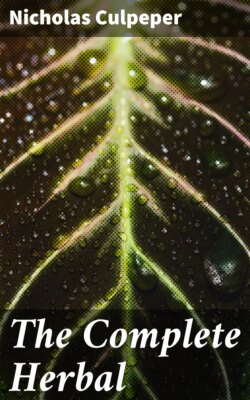Читать книгу The Complete Herbal - Nicholas Culpeper - Страница 49
На сайте Литреса книга снята с продажи.
BORAGE AND BUGLOSS.
ОглавлениеTable of Contents
These are so well known to the inhabitants in every garden that I hold it needless to describe them.
To these I may add a third sort, which is not so common, nor yet so well known, and therefore I shall give you its name and description.
It is called Langue de Bœuf; but why then should they call one herb by the name of Bugloss, and another by the name Langue de Bœuf? it is some question to me, seeing one signifies Ox-tongue in Greek, and the other signifies the same in French.
Descript.] The leaves whereof are smaller than those of Bugloss but much rougher; the stalks rising up about a foot and a half high, and is most commonly of a red colour; the flowers stand in scaly round heads, being composed of many small yellow flowers not much unlike to those of Dandelion, and the seed flieth away in down as that doth; you may easily know the flowers by their taste, for they are very bitter.
Place.] It grows wild in many places of this land, and may be plentifully found near London, as between Rotherhithe and Deptford, by the ditch side. Its virtues are held to be the same with Borage and Bugloss, only this is somewhat hotter.
Time.] They flower in June and July, and the seed is ripe shortly after.
Government and virtues.] They are all three herbs of Jupiter and under Leo, all great cordials, and great strengtheners of nature. The leaves and roots are to very good purpose used in putrid and pestilential fevers, to defend the heart, and help to resist and expel the poison, or the venom of other creatures: the seed is of the like effect; and the seed and leaves are good to increase milk in women’s breasts; the leaves, flowers, and seed, all or any of them, are good to expel pensiveness and melancholy; it helps to clarify the blood, and mitigate heat in fevers. The juice made into a syrup prevails much to all the purposes aforesaid, and is put, with other cooling, opening and cleansing herbs to open obstructions, and help the yellow jaundice, and mixed with Fumitory, to cool, cleanse, and temper the blood thereby; it helps the itch, ringworms and tetters, or other spreading scabs or sores. The flowers candied or made into a conserve, are helpful in the former cases, but are chiefly used as a cordial, and are good for those that are weak in long sickness, and to comfort the heart and spirits of those that are in a consumption, or troubled with often swoonings, or passions of the heart. The distilled water is no less effectual to all the purposes aforesaid, and helps the redness and inflammations of the eyes, being washed therewith; the herb dried is never used, but the green; yet the ashes thereof boiled in mead, or honied water, is available against the inflammations and ulcers in the mouth or throat, to gargle it therewith; the roots of Bugloss are effectual, being made into a licking electuary for the cough, and to condensate thick phlegm, and the rheumatic distillations upon the lungs.
